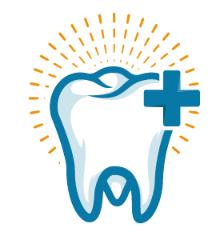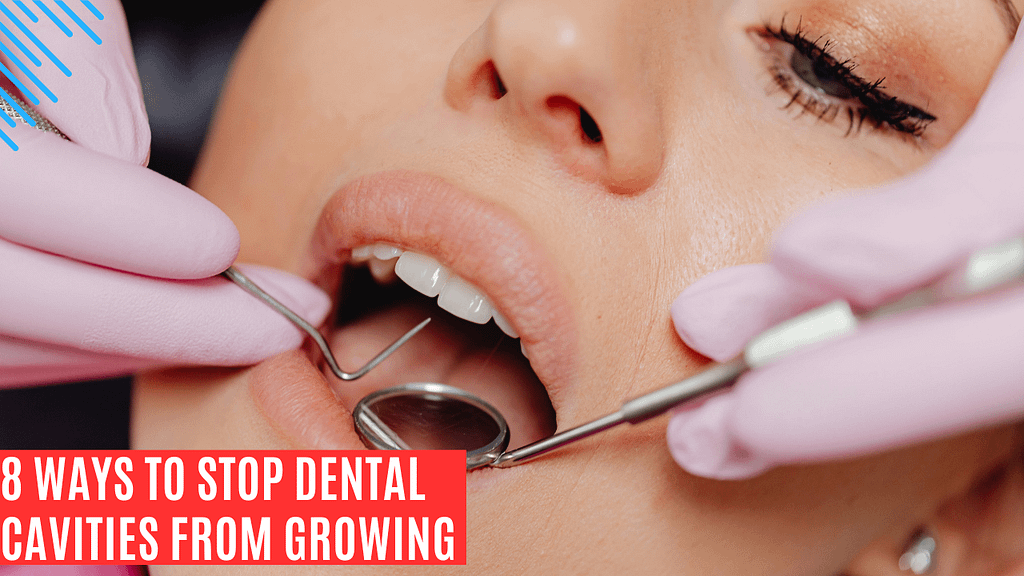Are you suffering from dental cavities and finding a way how to stop cavities from growing? Don’t fret; they can be easily prevented by following good dental practices and regular dental examinations.
This article will cover all the aspects of dental cavities and provide ways to prevent the cavity from worsening.
Find more tips and oral directions to a brighter smile at our blog.
What are Dental Cavities?
It’s essential to grasp what tooth decay is before learning about dental cavities since cavities are primarily caused by tooth decay.
Tooth decay is tooth enamel erosion caused by the acids produced by harmful bacteria inhabiting the oral cavity.
Therefore, cavities are the spots/tiny holes on teeth where dental decay has harmed the enamel(the hard surface of the tooth).
Untreated cavities can result in severe repercussions such as gum disease, tooth loss, and oral infections.
People of all ages, including toddlers, adults, and the elderly, are prone to cavities.
Causes Of Dental Cavities
There are several causes of tooth decay and dental cavities, ranging from plaque buildup to enamel destruction.
Some of the main factors that cause or trigger tooth cavities are as follows:
- Poor oral hygiene
- Gingival recession
- Xerostomia/Dry Mouth
- Bacterial colonization
- Dental plaque
- Poor Diet
- Tooth grinding
- Genetics
- Sugar uptake
- Excess brushing
- Not getting enough fluoride
- Family history of tooth decay
Symptoms Of Tooth Decay and Dental Cavities
The severity of signs and symptoms of cavities vary from patient to patient. However, the following are the significant signs and symptoms of oral cavities:
- Tooth sensitivity.
- Toothache and ear pain.
- White teeth stain
- Yellow or black stain on tooth enamel
- Holes/pits on teeth
8 Ways to Stop Dental Cavities from Growing/Getting Worse
These simple yet effective ways help to prevent/stop dental cavities from getting worse:
1. Use Fluoride Based Toothpaste To Combat Teeth Cavities
Use fluoride-based toothpaste to brush your teeth at least once a day. You should use fluoride-containing toothpaste to brush your teeth twice daily, just after each meal. Use floss or an interdental cleaner to clean in between your teeth. Where a toothbrush is unable to reach, this cleaner can.
Cleanse your mouth. A mouthwash containing fluoride may be suggested if your dentist determines you are at a high risk of developing cavities.
2. Avoid Sugar Containing Products
By limiting sugar consumption, the chances of cavities can be prevented, as sugary products create a favourable environment for acid-producing bacteria. These acids lead to enamel destruction, thus causing tooth cavities.
Instead, try to incorporate dairy products (milk, cheese, yoghurt), fresh vegetables and fruits to enhance the overall health of the oral cavity.
Maintaining a well-balanced diet benefits general health and tooth decay prevention. Eat more meals high in calcium, phosphorus, and vitamin D, particularly for dental health. These aid in remineralization and fortify tooth enamel.
3. Saltwater Rinse to Prevent Oral Cavities
Several investigations have demonstrated that salt has a wide range of antibacterial effects.
For oral wounds, dentists recommend rinsing the mouth with salt water to promote healing.
Moreover, saltwater contains antimicrobial qualities that prevent harmful cavity-causing bacteria from growing in your mouth.
By inhibiting the growth of these harmful microbes, saltwater reduces the likelihood of tooth cavities.
4. Regular Dental Checkups To Stop Dental Cavities
See your dentist regularly. Regular oral examinations and teeth cleanings can help identify issues early on or prevent them altogether.
You can get advice from your dentist about the best treatment options for yourself.
5. Teeth Sealants
Think about sealants for teeth. A plastic coating that protects the chewing surface of back teeth is called a sealant.
It seals up the nooks and crevices where food tends to accumulate, protecting tooth enamel from acid and plaque.
Sealants should be examined frequently but can last for several years before needing to be changed.
6. Fluoride Treatments to Stop Cavities
If you don’t get enough fluoride from fluoridated drinking water and other sources, your dentist might suggest periodic fluoride treatments.
If you have a very high risk of tooth decay, your dentist may also suggest special trays that fit over your teeth to apply prescription fluoride.
7. Antiseptic Mouthwash To Prevent Dental Cavities
Your dentist may suggest specific antiseptic and disinfecting mouth rinses like chlorhexidine or other treatments to reduce harmful germs in your mouth if tooth decay is likely, for example, due to a medical condition.
Mouthwash, also known as mouth rinses, is generally not advised for children under six unless specifically instructed by their dentist to prevent overconsumption.
8. Proper Hydration
Maintaining good dental health requires drinking plenty of water regularly to stay hydrated. Water keeps your mouth clean and reduces the chance of cavities by flushing away food particles.
Saliva is produced more when you drink water, one of your mouth’s natural defences against cavities. It functions by eliminating dangerous microorganisms and neutralizing acids.
Bottom Line
Healthy eating habits, frequent dental treatment, and consistent oral hygiene are all necessary to reduce or stop the development of cavities. You can avoid or reduce the spread of cavities and maintain a bright smile by adhering to these easy steps.
Find more information at oral directions about dental health.
FAQs
Can you stop or reverse a cavity from getting worse?
Yes, it is possible to prevent cavities from progressing by practising good oral hygiene and visiting the dentist regularly, but the damage done by the cavity is irreversible.
Can a cavity be stopped once it starts?
While you can’t reverse a cavity, you can stop it from worsening by promptly maintaining proper oral care and seeking professional treatment.
How to stop a cavity from growing at home?
To prevent a cavity from growing at home, brush and floss regularly, use fluoride toothpaste, and reduce sugary food and drink intake.
Can you heal a cavity naturally?
Cavities cannot be healed naturally, but early decay can sometimes be remineralized with fluoride treatments and maintaining excellent oral hygiene.

